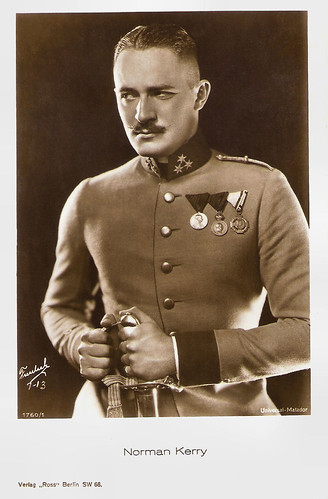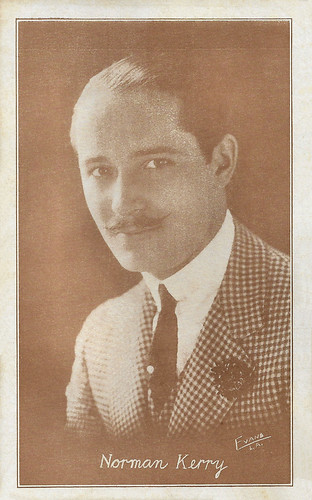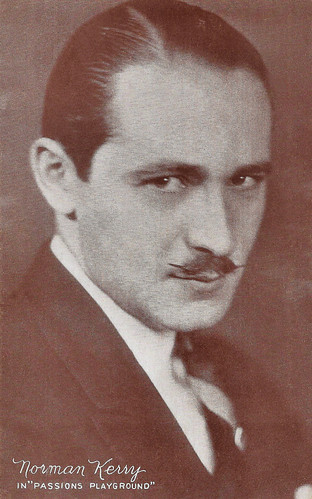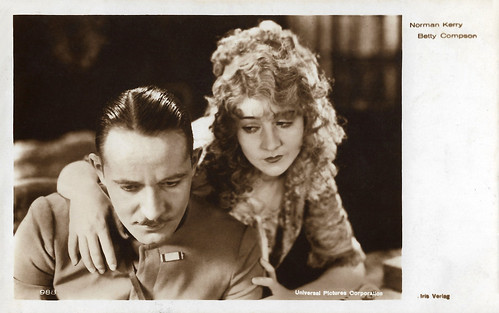
French postcard by Cinémagazine-Edition, no. 401. Photo: Roman Freulich. Norman Kerry in Merry-Go-Round (Rupert Julian, Erich von Stroheim, 1923). Norman Kerry's surname is misspelled on the card as Keery.

Austrian postcard by Iris Verlag, no. 988. Photo: Universal Pictures Corporation. Betty Compson and Norman Kerry in Love Me and the World Is Mine (Ewald André Dupont, 1927).

Spanish collectors card by Chocolates Amatller, Barcelona, in the 'Artistas de cine' series, no. 5: Norman Kerry. Image: Martinez Surroca.

German postcard by Ross Verlag, Berlin, no. 1760/1, 1927-1928. Photo: Freulich / Universal-Matador. Norman Kerry in Merry-Go-Round (Rupert Julian, Erich von Stroheim, 1923).
A matinee idol with his slicked-back hair and thin, waxed mustache
Of German origin, Norman Kerry was born Arnold Kaiser in Rochester in New York State in 1894.
Kaiser began working as a clerk in the New York fur trade but felt that he had no aptitude for this type of work. He left everything and became a theatrical agent. Kaiser changed his name to Norman Kerry during the First World War.
In 1916, he met Rudolph Valentino, and the two soon became friends. It was Kerry who advised the Italian to try his hand at the young film industry. Kerry played his first part in the Douglas Fairbanks film Manhattan Madness (Allan Dwan, 1916).
Immediately after his film debut, he had an important lead in the Mary Pickford film A Little Princess (Marshall Neilan, 1917). A second success followed with the Constance Talmadge film Up the Road with Sallie (William Desmond Taylor, 1918).
Norman Kerry became a matinee idol with his slicked-back hair and thin, waxed mustache.

American postcard. Photo: Evans, L.A.

American postcard. Norman Kerry in Passion's Playgroun (J.A. Barry, 1920).

American postcard. Photo: Universal. Norman Kerry in Merry-Go-Round (Erich von Stroheim, 1923).

French postcard in the Les Vedettes de Cinéma series by A.N., Paris, no. 239. Photo: Universal Film.
An aristocrat posing as a salesman
His popularity peaked in 1923, when he acted as the dashing Captain Phoebus in The Hunchback of Notre Dame (Wallace Worsley, 1923), starring Lon Chaney and Patsy Ruth Miller, and as the aristocrat posing as a salesman in Merry-Go-Round (Erich von Stroheim, Rupert Julian, 1923), with Mary Philbin as his love interest.
Norman Kerry was again paired with Philbin in another Lon Chaney classic, The Phantom of the Opera (Rupert Julian, 1925). The third get-together with Chaney happened with the bizarre horror film The Unknown (Tod Browning, 1927), starring Chaney and Joan Crawford. Kerry plays Chaney's rival as a strongman, risking being ripped apart in a circus act when Chaney's character takes revenge for having needlessly removed his both own arms.
Kerry continued to appear in several films and alongside the leading actresses of the moment, including Lillian Gish in Annie Laurie (John S. Robertson, 1927), Bebe Daniels, Irene Rich, Eleanor Boardman, Corinne Griffith, Pauline Starke, Aileen Pringle, and many others.
Norman Kerry was not so lucky in his personal life as he married three times. With the advent of sound cinema, he did not have the desired success, and after 1931 he stopped. Having acted in the film The Foreign Legion (Edward Sloman, 1928), Kerry drew his conclusions and joined the real French Foreign Legion.
He returned to the United States only in 1940, when France was invaded by Hitler's Nazi army, and acted in one last film. Norman Kerry died in Los Angeles in 1956, at the age of 61, the victim of liver disease.

French postcard by Cinémagazine-Edition, no. 401. Photo: Roman Freulich. Norman Kerry in Merry-Go-Round (Rupert Julian, Erich von Stroheim, 1923). Norman Kerry's name is misspelled and sexchanged into Norma Keery.

British Real Photograph postcard.

British postcard in the Picturegoer Series, London, no. 121.

German postcard by Ross Verlag, Berlin, no. 1287/1, 1927-1928. Photo: Roman Freulich / Universal Pictures Corporation.

Austrian postcard by Iris Verlag, no. 988. Photo: Universal Pictures Corporations. Norman Kerry and Betty Compson in Love Me and the World Is Mine (Ewald André Dupont, 1927).

Austrian postcard by Iris-Verlag, Berlin, no. 510.
Sources: Wikipedia (English and Italian), and IMDb.
No comments:
Post a Comment